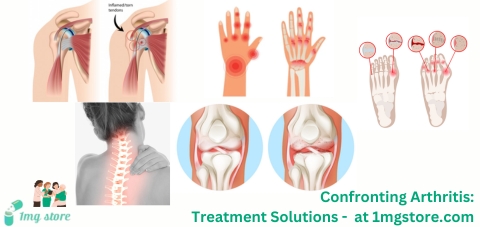
Arthritis
-
Generic: Hydroxychloroquine SulfateEquivalent Brand: Plaquenil30 Tablet/s$8.00
-
Generic: MethotrexateEquivalent Brand: Rheumatrex30 Tablet/s$7.00
-
-
-
Generic: ColchicineEquivalent Brand: Colcrys30 Tablet/s$4.00
-
Generic: TriamcinoloneEquivalent Brand: Kenalog30 Tablet/s$8.00Out of stock
-
Generic: TocilizumabEquivalent Brand: Actemra1 Vial$1260.86
-
Generic: TriamcinoloneEquivalent Brand: Kenalog10 Injection$30.00
-
Generic: AllopurinolEquivalent Brand: Lopurin30 Tablet/s$8.90
-
Generic: AllopurinolEquivalent Brand: Zyloprim30 Tablet/s$6.40
-
Generic: FebuxostatEquivalent Brand: Uloric30 Tablet/s$10.00
-
Generic: Glucosamine SulphateEquivalent Brand: Cartigen30 Capsule/s$17.33
Embracing Comfort: The Significance of Arthritis Medicines in the Journey to Joint Health
Introduction:
Arthritis, a common yet often misunderstood condition, affects millions of individuals worldwide, impacting their quality of life and overall well-being. The category of Arthritis Medicines emerges as a beacon of hope for those grappling with joint pain, inflammation, and reduced mobility. This comprehensive guide explores the importance of Arthritis Medicines, delving into the complexities of arthritis, the diverse forms it can take, and the pivotal role these medications play in enhancing joint health and restoring comfort.
Understanding Arthritis:
Arthritis is a broad term encompassing a group of inflammatory joint disorders characterized by pain, swelling, stiffness, and reduced joint mobility. The most prevalent forms include osteoarthritis (OA), rheumatoid arthritis (RA), and psoriatic arthritis, each with its unique characteristics and underlying causes. The impact of arthritis extends beyond the physical realm, affecting mental and emotional well-being as individuals navigate the challenges posed by chronic joint discomfort.
The Importance of Arthritis Medicines:
1.Pain Management:
Arthritis Medicines, particularly analgesics and nonsteroidal anti-inflammatory drugs (NSAIDs), are crucial in managing pain associated with arthritis. By alleviating pain, these medications enhance individuals' ability to perform daily activities and improve their overall quality of life.
2.Reducing Inflammation:
Inflammatory forms of arthritis, such as rheumatoid arthritis, involve an immune system attack on the joints, leading to inflammation and joint damage. Medications like disease-modifying antirheumatic drugs (DMARDs) and biologics target the inflammatory processes, reducing joint swelling and preventing further damage.
3.Preserving Joint Function:
Arthritis Medicines, when administered appropriately, help preserve joint function and mobility. This is particularly vital in osteoarthritis, where joint wear and tear can lead to decreased range of motion. Medications like glucosamine and chondroitin sulfate may also contribute to joint health by supporting cartilage structure.
4.Delaying Disease Progression:
For individuals with inflammatory arthritis, early and effective intervention with Arthritis Medicines can delay disease progression, minimizing joint damage and preserving joint function over the long term. This proactive approach is essential in managing chronic conditions like rheumatoid arthritis.
5.Customized Treatment Plans:
Arthritis Medicines offer a range of options, allowing healthcare professionals to tailor treatment plans to individual needs. From oral medications to injectables, the versatility of available treatments ensures that individuals receive personalized care based on the type and severity of their arthritis.
6.Combating Autoimmune Responses:
In autoimmune forms of arthritis, the immune system mistakenly attacks the body's own tissues. Immunosuppressive medications, including corticosteroids and DMARDs, play a critical role in suppressing these autoimmune responses, providing relief from symptoms and preventing further joint destruction.
7.Managing Coexisting Conditions:
Arthritis often coexists with other health conditions, such as cardiovascular issues and diabetes. Arthritis Medicines contribute to holistic patient care by managing these coexisting conditions, ensuring comprehensive health management for individuals with arthritis.
8.Improving Quality of Life:
Chronic pain and reduced joint function can significantly impact an individual's quality of life. Arthritis Medicines address these challenges, offering relief from symptoms, enhancing joint health, and contributing to an improved overall sense of well-being.
9.Supporting Mental and Emotional Health:
Living with chronic arthritis can take a toll on mental and emotional health. Arthritis Medicines that effectively manage symptoms provide individuals with the tools to navigate their daily lives with greater ease, reducing stress and contributing to a positive mindset.
10.Enabling Active Lifestyles:
Arthritis Medicines empower individuals to lead active lifestyles by mitigating pain and inflammation. This enables them to engage in regular physical activity, which is crucial for maintaining joint health, managing weight, and preventing further joint deterioration.
Conclusion:
In conclusion, the importance of Arthritis Medicines in the landscape of healthcare is profound. As individuals face the challenges posed by arthritis, these medications emerge as essential tools for managing symptoms, preserving joint health, and enhancing overall well-being. By addressing the multifaceted aspects of arthritis, from pain management to inflammation reduction and disease modification, Arthritis Medicines play a pivotal role in empowering individuals to embrace comfort and lead fulfilling lives despite the presence of chronic joint conditions.


